Federica Buccoli: From Cagliari to Seoul, the new life of a food content creator | Olianas
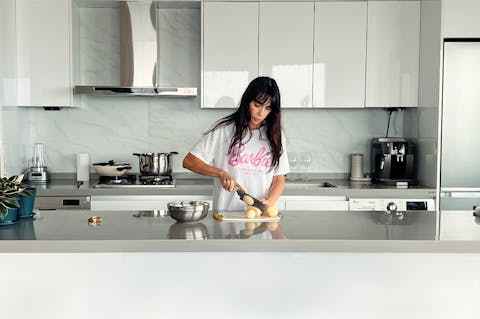
People
Federica Buccoli: From Cagliari to Seoul, the new life of a food content creator
by Jessica Cani
Federica Buccoli, known on social media as missmambokitchen, has done what many dream of but few dare: leaving everything behind to move to the other side of the world in pursuit of a professional project. From Cagliari to Seoul, with a suitcase full of ambition, she has transformed a profile born among blogs and recipes into a living laboratory of gastronomic storytelling and metropolitan life.
In Seoul, Buccoli found an ecosystem where the role of the creator is recognized as a cultural and economic force. Here, Italian food is aspirational, wine is a social language, and the city is a constant training ground for adaptation: local markets versus “jewelry-like supermarkets,” soups at any hour, and a meat culture unlike our own. Federica explains how and where to shop, how much it really costs to cook abroad, and what it means to translate a tradition without distorting it. Her content is born from the fertile tension between two cuisines and two lifestyles, with collaborations ranging from restaurants to aesthetic clinics (a typical feature of the local market), and video formats with Korean chefs who speak Italian and reinterpret iconic recipes.
Close to real life, Buccoli is building, day by day, a meaningful career — one that, unfortunately, often goes unrecognized in her homeland, Sardinia.
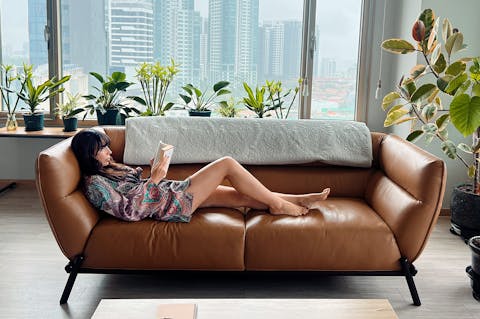
“At the beginning, there was no communication strategy at all,” says Federica Buccoli. Her journey began spontaneously, almost naively: a personal blog, a few recipes written with passion, and then Instagram, used simply to bring readers to the blog. “Over time, it became a food page because I started posting more and more pictures of food, which were very much appreciated.” It was the era when the word creator didn’t even exist, and those who cooked to share did so out of pure curiosity.
For Federica, cooking was never an obvious inheritance. “At home, cooking wasn’t particularly elaborate. My mother preferred to do other things; my father cooked occasionally, more to relax than out of passion.” In that simple domestic context, her desire to experiment and discover was born.
Inspiration came from her grandmother, an excellent cook. But Federica didn’t stop at the memory — she observed and reinterpreted it, adding new ingredients and challenging herself with dishes she saw elsewhere. Her curiosity became discipline. It was there, between the home oven and her first smartphone photos, that Mambokitchen took shape: not yet a brand, but already an identity in the making.
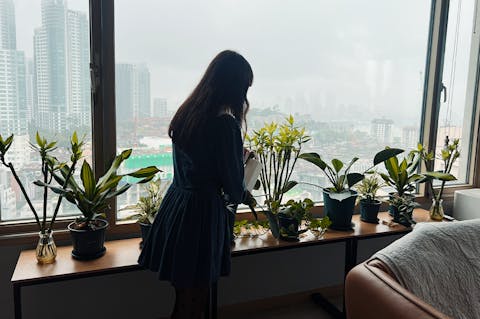
The turning point came gradually. “After two or three years of collaborations, I realized it could become a real job if managed well and with daily commitment,” she recalls. At a time when social media was only beginning to be seen as a professional tool, her consistency was key: publishing, improving, responding, and building trust.
The first brand to believe in her wasn’t Sardinian but a small winery from Veneto. “In Sardinia, brands back then didn’t believe in social media at all. They still preferred print,” she explains. In that statement lies the gap of an island that, at the time, struggled to see digital media as a genuine opportunity for growth.
Every professional has their turning point, and for Federica, it became a true manifesto of professional dignity. “A major pasta brand once asked me to create three or four recipes in exchange for product packages. When I explained that this was my job, and that I could buy the products myself if needed, they replied: ‘With that attitude, I don’t think you’ll get very far.’” A few years later, Barilla contacted her for an official collaboration — and almost simultaneously, the same brand reached out again. “I simply replied: I’m sorry, I’m already working with Barilla.”
Behind that anecdote lies the realization that creativity is work, and that every profession — even that of a creator — requires skill, time, and value. Federica chose to treat her activity with the seriousness of a business, marking the transition from improvisation to intention.
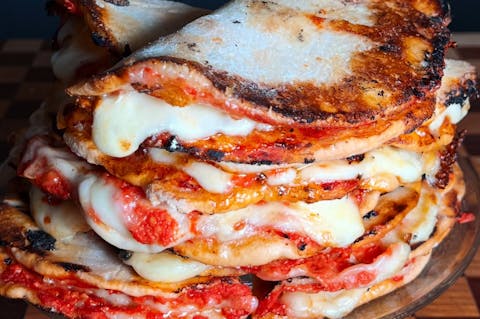
“Everything digital in Sardinia always arrives late.” Buccoli says it with realism — and I completely agree. The island that saw us grow professionally is also the one that taught us how difficult it can be to make people understand the value of digital work. “Gaining authority here, in what we do, isn’t easy,” she says. In recent years, the situation has improved, but there is still a gap between those who communicate as a profession and those who merely imitate. “Everyone is replicating identical content, but few have actually studied communication and marketing or developed their own ideas.”
The result is a landscape that is often homogenized, where formats repeat themselves and the idea of “success” is measured in views rather than tangible results.
Her perspective, however, is not merely critical: she knows that every territory has its own pace of growth and that the digital world, to truly take root, needs context, language, and education. From this awareness comes her strength — understanding local dynamics to engage with international markets without losing her roots.
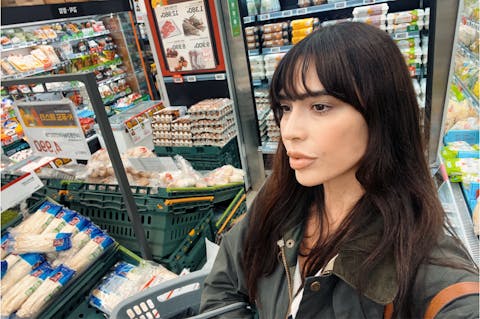
Federica Buccoli’s first trip to South Korea dates back to November 2024 — a journey born out of curiosity that ended up becoming a life choice. “I fell in love and had this strange feeling of being at home, even though I was on the other side of the world,” she recalls. “It wasn’t just the fascination with a different culture: there was something deeper, an inexplicable familiarity with the gestures, rhythms, and composed kindness of the people. And here, the figure of the influencer is highly respected. It’s a real profession, and at the embassy, you can even apply for an influencer visa. They recognize the value creators bring to brands, companies, and to the country itself, by promoting tourism and contributing to South Korea’s image.”
In a context where digital communication is an integral part of the national development strategy, the role of the creator carries a different weight: it’s not just entertainment, but a tool of reputation, culture, and business.
Collaboration offers started arriving even before her permanent move — from restaurants, aesthetic medicine clinics, and lifestyle and hospitality brands. “Every day, someone different would reach out,” she says. “Sometimes it was agencies, other times small local businesses that had discovered my content. All shared one clear awareness: in Korea, digital is not an accessory but an economic engine.”
For Federica, that steady flow of opportunities was the sign she had been waiting for — the confirmation that Korea was fertile ground on which to build a new phase of her career.
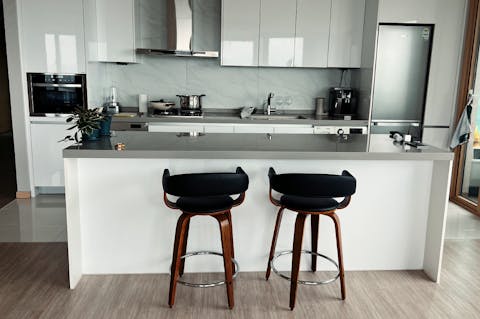
Living in Seoul is a perfect balance between efficiency and vitality. It’s a city that works, yet still manages to surprise you: clean, organized, full of carefully crafted details, but never cold. Every street is a world of its own — from bustling markets to minimalist cafés where time seems to stand still. Despite its size, it’s a metropolis that still makes you feel part of something.
Of course, some things can be disorienting at first. Grocery shopping, for example. “I’ve seen jars of Parmesan cheese for 60 euros and packs of apples priced like jewelry,” she says. But it doesn’t take long to learn how to get around: changing neighborhoods, figuring out where to buy, discovering the right markets. Once you truly live there, you realize Seoul isn’t inaccessible at all — it’s simply a city you have to learn to read.
“Koreans are increasingly speaking English; they’re curious, kind, and eager to get to know people from abroad,” says Federica. You can feel it in the small gestures — in the way they welcome you at restaurants and in local markets.
Even her home reflects this dual spirit: discipline and warmth. It’s an apartment designed for expats, with a large, bright kitchen full of plants, cared for by a landlord who works between Singapore and the United States. “It’s not the typical Korean home,” she says, “but a space suspended between cultures.”
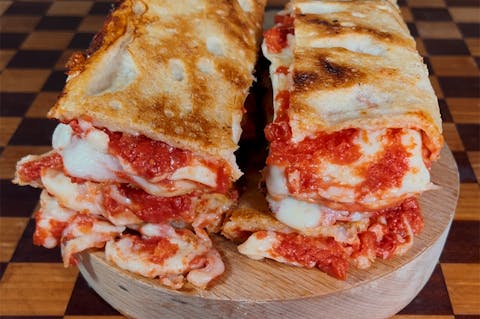
In Seoul, Federica Buccoli has found her new mission: to tell the story of Korea like no one else does. “I want to show Korean traditions, food, how people behave in everyday life. Here, most creators only talk about skincare, K-dramas, and trendy places. But there’s a whole world to explore.”
Her gaze, once again, is that of a storyteller who starts from the everyday: the market, shared meals, the rituals of eating together. A slow and curious observation that digs beneath the polished surface of social media to reveal a real Korea, made up of small gestures and daily habits.
But there’s another direction too—one that weaves the two cultures together: bringing Italy into Korea. For example, Federica is currently organizing an Italian cooking event in a new venue run by a Korean who lived in Italy and fell in love with our way of understanding food and conviviality. “I’ll go back to my roots, like when I used to organize events in Cagliari,” she says.
By her side, a special collaborator: a Korean chef who speaks Italian, studied in Tuscany, and reinterprets our dishes with a local touch. Together, they are creating a new gastronomic language—one where respect for tradition meets creative freedom.
Her work as a food creator thus becomes a conversation between cultures through food, built on mutual curiosity and sensitivity. With this project, Federica aims to build a bridge that unites two different yet compatible worlds.
Federica Buccoli’s story proves that food can be a cultural passport, a bridge between distant worlds, a language capable of uniting where words fall short.
Reinventing oneself thousands of kilometers from home is a life choice that speaks of openness but also of understanding the value of one’s work. Of course, change can be frightening—but it’s in the discomfort of the unknown that growth is born. To dare also means this: to accept not knowing everything and to learn again.
Telling the world through food in this way is not tourism—it’s relationship: sitting in the market, understanding why Koreans eat soup for breakfast, discovering that pork belly barbecue costs as much as jewelry. It’s respect and exchange, contamination and shared discovery.
